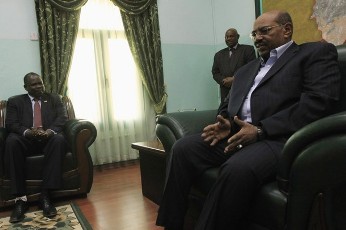Bashir tells South Sudan to offer security for settling post-secession issues
April 9, 2012 (KHARTOUM) – The Sudanese president Omer Al-Bashir has encouraged the government of South Sudan to reach a deal on security with his country, saying that such step will pave the way for resolving other points of contention between the two neighbours.

Security is among a host of issues Sudan and South Sudan have been negotiating to settle since the latter seceded in July last year under a 2005 peace deal that ended more than two decades of north-south civil wars in the former united Sudan. Other issues include delimitation of borders, citizenship and oil exports.
Continued failure to resolve post-secession issues – which are being negotiated in the Ethiopian capital Addis Ababa under the mediation of the African Union High Level Panel (AUHIP) – has fueled war rhetoric and military confrontations between the two countries.
Al-Bashir said in his address that Khartoum remains committed to the principle of negotiations and dialogue with Juba through the AUHIP.
However, his speech also dwelled on the “violations and aggressions” he said South Sudan has been committing against his country, citing Juba’s alleged military assaults on Sudanese territories with the rebel Sudan People’s Liberation Movement North (SPLM-N) and rebel groups from the western region of Darfur.
Al-Bashir was due to visit Juba on 3 April to hold a summit with his South Sudanese counterpart Salva Kiir after the two countries’ negotiators initialed two agreements on border demarcation and nationality on the basis of the four freedoms. Khartoum however called off the summit after South Sudan’s army known as the SPLA attacked Sudan’s oil-rich town of Heglig in response to what Juba alleged was provocations by the Sudanese army (SAF).
The latest round of negotiations between Sudan and South Sudan on security ended last week without an agreement after Khartoum withheld response to the mediators’ proposed draft, citing dissatisfaction with the absence of an admission on Juba’s alleged support to the rebels.
The issue of security appears to have occupied the top of Sudan’s priorities, in a sign that Khartoum might have arrived at the conclusion that it cannot defeat the insurgency in the border states of South Kordofan and Blue Nile as long as the rebels remain supported by Juba as it claims.
Sudan’s defense minister Abdel-Rahim Mohamed Hussein indicated last week that Khartoum is seeking to reach with Juba a security deal similar to the one made between Sudan and Chad, which ended a long period of mutual rebel support between Khartoum and Ndjamena.
Al-Bashir’s statement on security echoes that of his ruling National Congress Party (NCP) which issued a statement on Sunday saying it does not expect any relations with South Sudan to be normalized if the security issue is not settled. The party said it has decided not to engage further any political process with South Sudan or the rebel SPLM-N before dealing with security.
This is the first time the NCP speaks about seeking a settlement with the SPLM-N since Al-Bashir nullified a framework agreement signed in June last year by his negotiators with the rebel group.
Bashir invites political parties to join dialogue on constitution
In his address on Monday, Al-Bashir took the opportunity to declare that his government is actively seeking to ensure wide participation of political parties in drafting the country’s new constitution.
He called on all political forces to take part in work of the constitution committee by providing studies and proposals.
The issue of Sudan’s new constitution has been a subject of polarization in the domestic political arena between Islamist groups allied under the Islamic Constitution Front (ICF), which is lobbying for a constitution based on Shariah laws, and the coalition of mainstream opposition parties, the National Consensus Forces, which opposes calls for an Islamic constitution.
Last year, Al-Bashir announced that Sudan’s current interim constitution, which was installed under the peace deal with South Sudan in 2005, will be replaced with a new one that only recognizes Islam as the state religion and Arabic as the official language.
Separately, Al-Bashir emphasized his government’s commitment to fight corruption but accused opponents of the NCP of seeking to turn the campaign against corruption into a campaign for slander and false allegations.
He further warned the press which “they have given freedom of expression” against passing judgments on people without legal proof. He called on newspapers to eschew sensationalism and ascertain facts before publishing them.
In February this year, the privately-owned Sudanese daily newspaper Al-Tayyar was closed after it published a commentary accusing Al-Bashir and his family of corruption. The paper was allowed to resume production after it made a public apology.
(ST)
